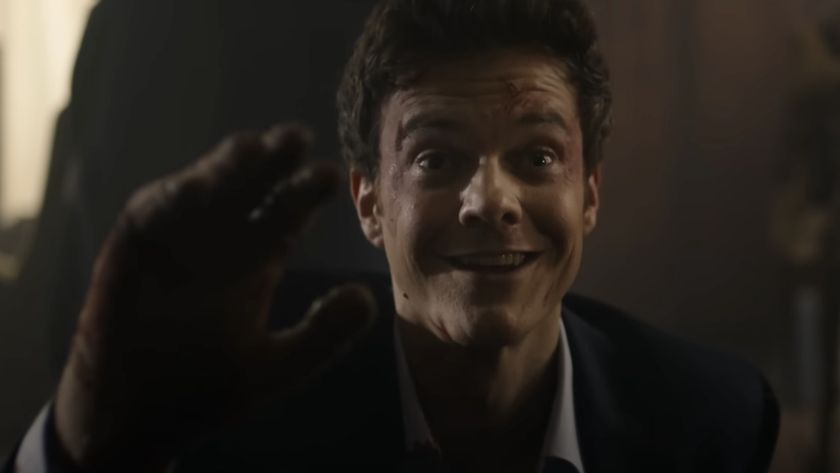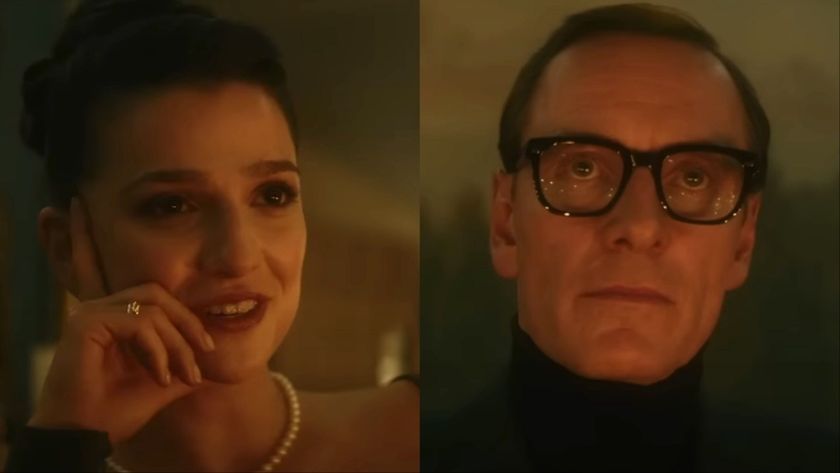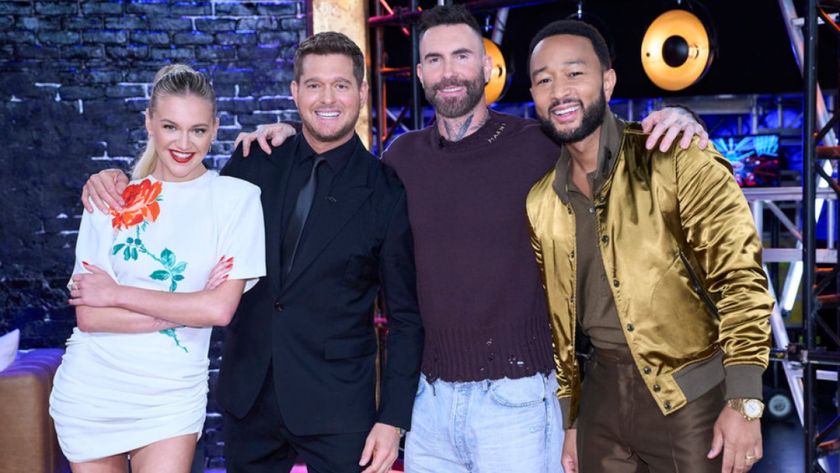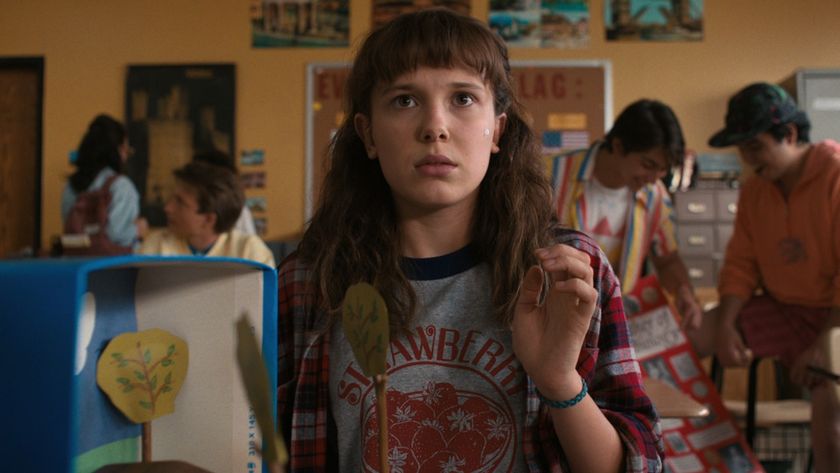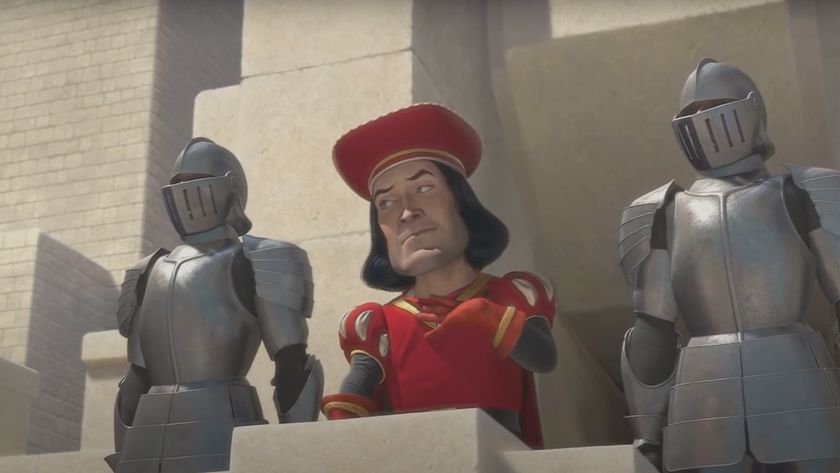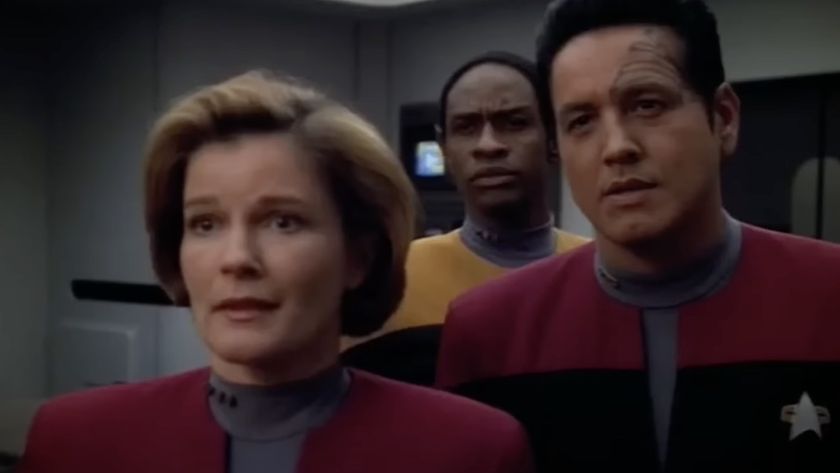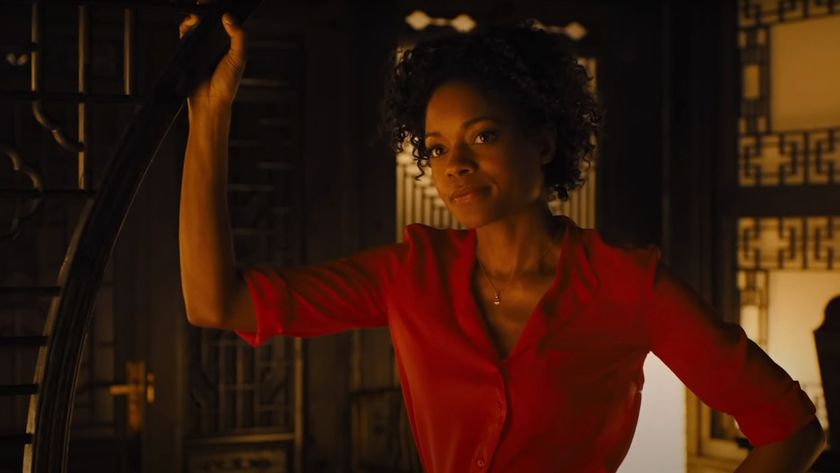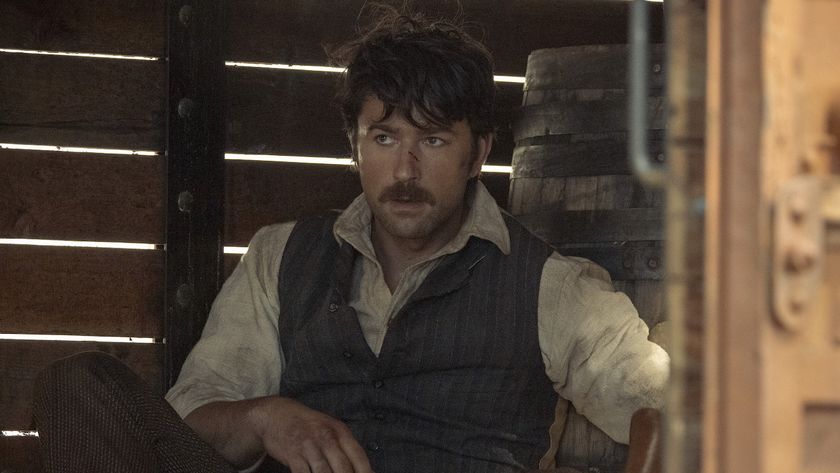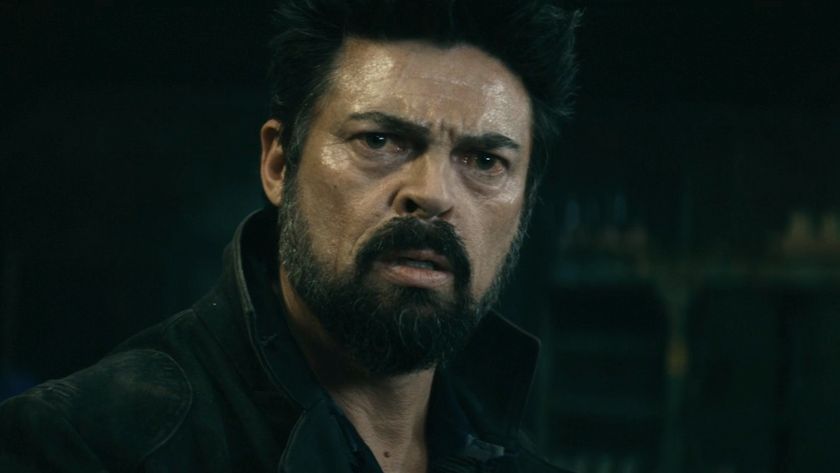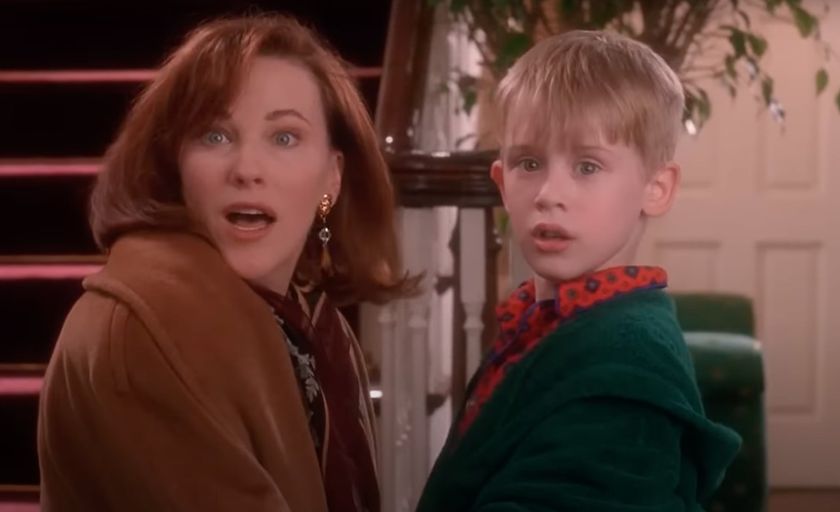The Avengers' Tom Hiddleston Talks The Madness Of Loki, His Hope For Redemption In Thor 2
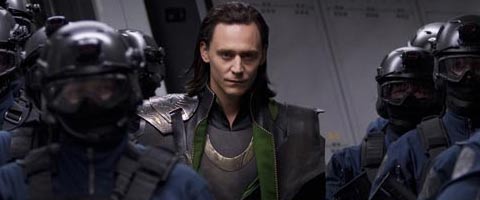
Loki, as played by Tom Hiddleston in The Avengers, is completely bonkers. Following the events of Thor a movie in which the character discovers that he was adopted, is actually a monster, and tries to destroy and entire world, Loki has lost every bit of sanity within him and that then leads him to try and take over Earth. Amazing as it is to watch, it’s even more fascinating to hear about the headspace that Hiddleston entered and his psychological explanation of the character.
A few weeks ago I had the fantastic opportunity to sit down with Tom Hiddleston one-on-one at the press day for The Avengers and talk about his portrayal of the God of Mischief in the new Marvel movie. Check out the interview below in which the actor discusses Loki’s desire to take over the planet, his self-perception, and how he’d like to see the character experience some kind of redemption.
I don’t know if you remember me from when we spoke during the Thor press day…
Yeah! Yeah!
I was really hoping to continue our conversation about Loki from a psychological standpoint, because I really think he’s such a fascinating villain. He’s obviously completely off base, but the way his mind works is incredible and I was hoping we could talk about it from that angle. For starters, in this film Loki makes the claim that humans were born to be ruled. I was hoping you could talk about approaching that idea through the character.
It’s kind of an inversion of that, in that Loki is a character who, for his entire life, was brought up with an expectation of entitlement. So he was lead to believe, with Thor, that he was born to rule. He was a prince who would exceed to a position of kingship. And it’s true! Odin says at the beginning of Thor to the young boys of Asgard, “Only one of you may ascend to the throne, but both of you were born to be kings. Loki was obviously born to be king of Jotunheim and he only finds that out about halfway through Thor. But then because of what happens in Thor and the revelations of his lineage and geniality, there is a sense of intense betrayal at the heart of him, and that’s where, as you say, he went completely mentally, psychologically off base.
And, really, he’s a kind of cocktail of psychological damage because he finds out late in life…the narrative of his life story is a lie, that he was, in fact, the bastard child of a monster, the mortal enemy of the royal family of Asgard. He was neglected, left out in the cold, then adopted, then lied to, then betrayed and all of that hardens and calcifies into an enormous anger, sadness and hatred. Basically, the motivation I think is Loki still has his expectation to rule, that that’s his purpose. If he’ll never rule Asgard, if he’ll never rule Jotunheim – because he tried to destroy it – so he’s come down to Earth to subjugate humanity and rule this planet. So if he has nowhere to belong in the universe, he can make the Earth belong to him. Some kind of self-esteem and identity…it’s all woefully misguided [laughs].
CINEMABLEND NEWSLETTER
Your Daily Blend of Entertainment News
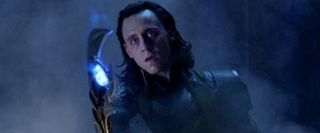
To kind of continue the question, I’m also curious about his self-perception as a God. Because the people of Earth see him that way – he’s the God of Mischief – but he’s not really a God in the purest definition of the word. That said, does Loki see himself as a God?
Absolutely. I think there’s such a degree of self-deception with it. We’re all capable of it – we tell ourselves lies all the time just to be able to survive. You could do something bad and it’s so easy to forgive ourselves for the things that we do, and Loki is the worst example of that. He’s completely unself-aware. Like, if he had a self-awareness he would STOP [laughs]. And I certainly think that he’s allocated himself to… I mean, Thor has a line in our scene on the mountaintop, he says to Loki, “You think yourself above them!” And Loki’s response is simply, “Well, yes.” Which is somebody who is completely self-deluded! He’s in line with the most famous fascists in human history – people who think they’re above everybody else.
There’s the scene in Germany with Captain America and Loki.
Yeah! And Captain America says, “Last time I saw this, a guy standing above everybody else, it didn’t end well.”
Do you think that Loki has any chance at redemption or is he forever lost?
I don’t think anybody is. I don’t think anyone, until their soul leaves their body, is passed the point of no return. And that’s what’s so fascinating about Loki in the comics and in the course of Scandinavian mythology, he’s constantly re-crossing that line, and he’s brought back into the fold, he’s forgiven, he forgives himself, and he goes off and does something equally appalling one more time. And that’s why he was incarnated as the God of Mischief. That’s his inclination, that’s his predisposition. He will always fall. In a way he’s an emblem of our capacity for fallibility. No matter how many times you forgive him, he’ll always reoffend. But I hope that there is redemption, a glimmer of redemption within him, because I think that’s exciting! I think that’s exciting for me to play, exciting for Chris.
Is it something that’s in the back of your mind?
Oh yeah! In the heart of Loki there is the heart of a lost child and around it he’s wrapped in a cloak of hatred and anger and pain and enormous power. But I think it’s much more exciting if I think there’s always a possibility, because then it makes him three-dimensional, it makes him complex, and you hope some people in the audience are fighting for that. It’s part of Thor’s motivation. It’s part of what makes Thor a good character, because Thor is fighting for his brother back. He wants his brother! He appeals to their childhood in this film, he says, “We fought together, played together. Do you remember none of that?” And Loki’s response is, “I remember a shadow.” So I hope that somewhere down the line – I haven’t seen a script for Thor 2 – I hope that somewhere in Thor 2 that’s something that is expanded on. I keep finding myself saying, I can’t remember who said it, but, “The opposite of love is not hate, but indifference” and Loki is not indifferent to Thor. Loki hates Thor, which must mean that underneath that he still loves him.
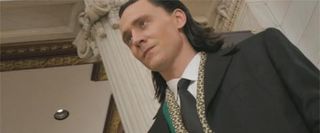
One of the greatest aspects of his character that was shown in Thor when he was trying to destroy Jotunheim for his father was that Loki seems to think that he is the hero of his own story. Do you think that’s still the case in The Avengers?
I think there’s an element of not giving a shit anymore [laughs]. I think he’s let go, certainly, of his need for the affection or pride of Odin. There’s a bit where Thor says, “We all mourned! Our father…” and Loki interrupts him and says, “YOUR father.” And it’s that sense of don’t include me in this anymore. I have no relation or connection to you. It’s his way of saying I’ve let go, I’m gone, I’m on the outside of the fence, I’m happy here, I don’t want to come back in. So that whole thing of trying to please his father is gone… I think we all see ourselves as the heroes in our own lives, so everybody is. He’s the protagonist in this movie, the motion picture of Loki’s life, he’s starring as Loki.
And when coming to this character again, you’re doing so with a new writer/director in Joss Whedon. How much collaboration and input did you have in this latest version of Loki and how much did the character change from the script you first saw to what we see on the screen?
A few things, I suppose. The great thing was that Joss really agreed with me and Ken [Branagh] on what we built the first time around. I was so lucky that he loved it. Joss saw an early cut of Thor and because he saw Thor and because he liked it is the reason I’m the bad guy in this, because he found it interesting and poignant and complex and it’s really up his street, as a character. And we wanted to take him further. The thing that I was very disciplined about was trying to expand his villainy into something much more feral and dangerous, which Joss was really pushing it towards. But, while doing that, never spilling into something two-dimensional and trying to retain the sort of spiritual complexity at the heart of him. So it never seemed like he was just an anarchist. Loki is not the Joker. He’s a different beast. There’s a much more sort of complicated psychological motivation. It’s all really human. The Joker is just chaos.
I was actually just saying that to somebody at the press screening last night [laughs].
[laughs] So I hope you can see that he’s not the same guy. I was trying to really preserve the psychological truth of that motivation. There was still this reservoir of pain bubbling away at the center of him.
And I know you said you haven’t seen a script for Thor 2 yet, but have you had the chance to speak with director Alan Taylor?
I’m set to meet him sometime very soon. I’ve been busy in London doing these Shakespeare films and he’s been here. But we know a lot of the same people. I hope he’s a fan of what I’ve done.
Have you been watching Game of Thrones?
I have. It’s wonderful. He’s the perfect man for the job. He understands dynastic drama. He understands kings and queens and fantasy stuff. So I’m excited. I mean, we’ve got so much more to do and the great thing about Thor is it’s Thor the comic, Thor the character opens up a whole other world. It’s a fantasy world, it’s a sci-fi world, it’s its own special thing that’s separate from the Iron Man universe and all the more Earthbound superhero stuff. Who knows where we’re going to go in Thor 2, man? It’s exciting! We start in September!

Eric Eisenberg is the Assistant Managing Editor at CinemaBlend. After graduating Boston University and earning a bachelor’s degree in journalism, he took a part-time job as a staff writer for CinemaBlend, and after six months was offered the opportunity to move to Los Angeles and take on a newly created West Coast Editor position. Over a decade later, he's continuing to advance his interests and expertise. In addition to conducting filmmaker interviews and contributing to the news and feature content of the site, Eric also oversees the Movie Reviews section, writes the the weekend box office report (published Sundays), and is the site's resident Stephen King expert. He has two King-related columns.
